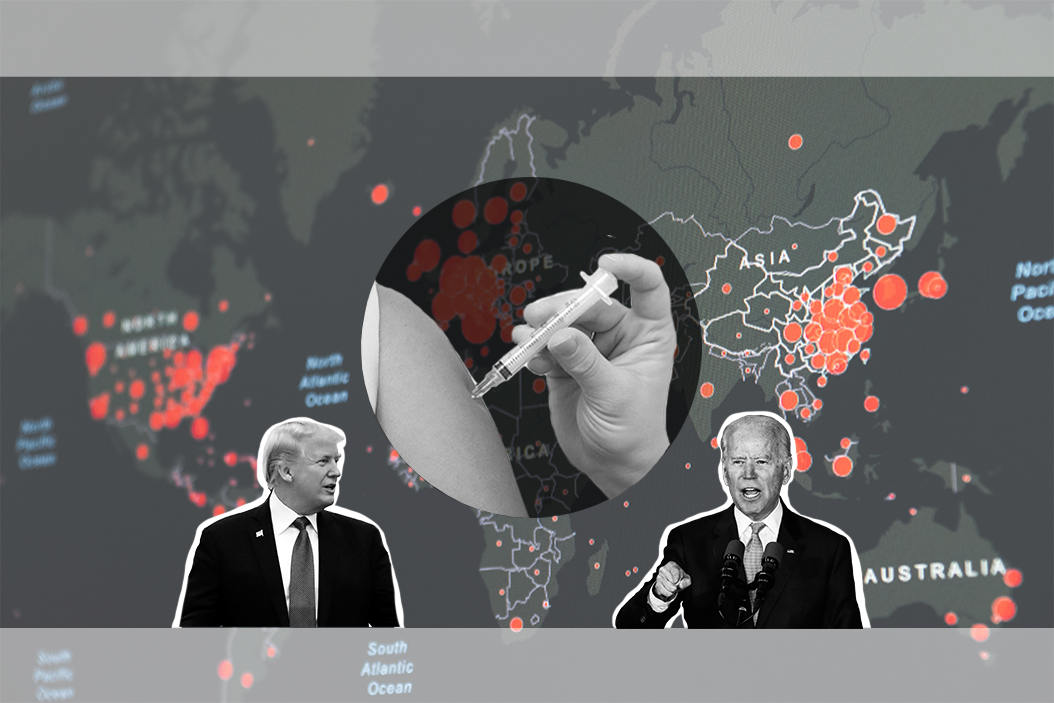November 09, 2020
US pharmaceutical giant Pfizer announced Monday that the coronavirus vaccine it is jointly developing with German company BioNTech is more than 90 percent effective at preventing COVID-19. The news that the end of the pandemic could be in sight drove global stock markets through the roof (except for Zoom!), and raised hopes around the world. Dr. Anthony Fauci, the US government's top infectious disease expert, called the preliminary figure "extraordinary."
What does this mean not only for the pandemic, but for the politics around it?
First, Pfizer's claim is based on an interim analysis of Phase III clinical trials on only 44,000 people. We still don't know if the vaccine will work when tested on a bigger sample size, or if the initial results will hold later on. Second, even if they do, the drug will still have to go through a process of national-level approvals.
Third, it will then have to be made accessible to the global population (at the moment, 11 other vaccines are in Phase III trials; Russia and China have already started administering their own drugs). And fourth, governments will have to convince their citizens to take the vaccine, which only 58 percent of Americans are willing to do right now amid growing skepticism worldwide.
In the meantime, get ready for some potentially messy vaccine politics in the US and around the world.
As the US reported over 100,000 new coronavirus cases for the third day in a row, US President Donald Trump tweeted out the good news, although it's unclear how he will proceed on approving a drug. After all, he can't benefit politically from it after being defeated by Joe Biden in the recent election. Pfizer has avoided the scrum of US presidential politics by not signing up to Operation Warp Speed, the Trump administration's plan to fast-track development, production, and distribution of a vaccine.
President-elect Biden, on the other hand, was cautiously optimistic about the vaccine, setting realistic expectations on when all Americans will be vaccinated. In any case, who would get those doses first — or at all — is a major issue. Pfizer CEO Albert Bourla raised some eyebrows when he said it would be available to all US citizens, potentially leaving out tens of millions of people who live and work in America on visas or green cards.
Globally, this is a broader consideration. More than 170 countries have joined the COVAX global initiative to ensure equitable distribution, but rich countries have been allowed to stockpile hundreds of millions of doses for their own people. Indeed, the European Union, Japan, the US, and the UK reserved a combined 450 million doses months ago of the Pfizer vaccine — which is not (yet) part of COVAX — months ago.
An immediate future in which developed nations get inoculated first while the developing world waits in line would not only prolong the public health and economic challenges of the coronavirus — it would exacerbate global inequality by slowing the speed at which poorer countries can bounce back.
The bottom line: Promising results for a COVID-19 vaccine are definitely a rare piece of good news in 2020. But the political and logistical challenges of approval and distribution are only just beginning, in the US and around the world.More For You
- YouTube
At the 2026 World Economic Forum, GZERO's Tony Maciulis spoke with Matthew Blake, Managing Director at the World Economic Forum, about a defining transition for Davos and the state of the global economy.
Most Popular
Former South Korean President Yoon Suk Yeol arrives at a court to attend a hearing to review his arrest warrant requested by special prosecutors in Seoul, South Korea, July 9, 2025.
REUTERS/Kim Hong-Ji/Pool/File Photo
5: The number of years South Korea’s ex-President Yoon Suk Yeol was sentenced in prison today, on charges related to his failed attempt to impose martial law last year.
Russian President Vladimir Putin speaks during a news conference after a meeting of the State Council on youth policy in Moscow, Russia, on December 22, 2022.
Sputnik/Sergey Guneev/Pool via REUTERS
The Russian president said little when the US seized Venezuelan strongman Nicolás Maduro, an ally of Moscow. But there might be a reason for his silence.
© 2025 GZERO Media. All Rights Reserved | A Eurasia Group media company.
